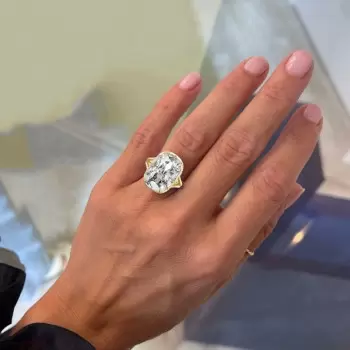Engagement rings symbolize love and commitment, but they can also reflect your values regarding sustainability and environmental responsibility. Eco-friendly engagement rings offer a beautiful way to honor these values while ensuring the ring you choose is ethically sourced, sustainable, and kind to the planet.
Understanding Eco-Friendly Engagement Rings
An eco-friendly engagement ring is crafted with sustainability in mind, using materials and practices that minimize environmental damage. This includes options such as lab-grown diamonds, recycled metals, and ethically sourced gemstones. Choosing a ring with these elements ensures you’re making an environmentally conscious decision.
Why Should You Choose an Eco-Friendly Engagement Ring?
Choosing an eco-friendly engagement ring aligns with a growing movement towards sustainability and ethical consumption. By selecting a ring made with ethically sourced materials or opting for lab-grown diamonds, you reduce the environmental footprint and support responsible practices in the jewelry industry.
The Environmental Impact of Traditional Mining
Traditional diamond mining has significant environmental and ethical consequences, including habitat destruction, soil erosion, and water pollution. Additionally, there are human rights concerns in areas where "blood diamonds" are mined. Opting for lab-grown diamonds or recycled materials can reduce these impacts and support more responsible practices.
Types of Eco-Friendly Engagement Rings
There are several eco-friendly options available when selecting an engagement ring, from lab-grown diamonds to recycled metals. Below are a few popular choices:
Lab-Grown Diamonds vs. Natural Diamonds
Lab-grown diamonds are created in controlled environments and are chemically and visually identical to mined diamonds, but without the environmental degradation associated with mining. They are an excellent choice for those looking for an eco-friendly alternative that doesn’t compromise on quality or beauty.
Recycled and Fair-Trade Metals
Recycled metals reduce the need for mining and the environmental impact associated with extracting new materials. Opting for a ring made from recycled gold, platinum, or silver ensures that your purchase supports sustainable jewelry practices.
Conflict-Free Diamonds and Gemstones
Conflict-free diamonds are sourced from areas that do not engage in illegal or unethical practices. They are a responsible choice for those who want to avoid "blood diamonds." Additionally, ethically sourced gemstones, such as sapphires, rubies, or moissanite, offer a beautiful and sustainable alternative to diamonds.
Sustainable Certifications to Look for in Jewelry
When choosing an eco-friendly engagement ring, look for certifications such as Fair Trade, Kimberley Process, and Responsible Jewellery Council (RJC). These certifications ensure that the materials used in your ring are sourced responsibly, and workers involved in the production process are treated ethically.
Popular Eco-Friendly Alternatives to Diamonds
Many people today opt for alternative gemstones for their engagement rings, not only for their aesthetic appeal but also for their lower environmental impact. Stones like moissanite, sapphires, and emeralds are growing in popularity as sustainable alternatives to traditional diamonds.
Moissanite: A Brilliant Diamond Alternative
Moissanite offers a nearly identical sparkle to diamonds but is more affordable and has a lower environmental impact, making it a great choice for eco-conscious couples.
Ethical Sapphires and Emeralds
Ethically sourced sapphires and emeralds provide vibrant color and are often mined under better conditions than diamonds. These gemstones offer a stunning, unique look for those looking for something different from the traditional diamond ring.
Where to Buy Eco-Friendly Engagement Rings
Many jewelers specialize in ethical and sustainable practices. Look for reputable brands that focus on sustainability, conflict-free materials, and transparent supply chains to ensure your engagement ring is truly eco-friendly.
Caring for Your Eco-Friendly Engagement Ring
Sustainability doesn’t end with the purchase of your engagement ring. Proper care and maintenance ensure its longevity. Regular cleaning with eco-friendly products and gentle storage practices will help keep your ring looking beautiful for years to come.
FAQs
What is an eco-friendly engagement ring?
An eco-friendly engagement ring is made using sustainable, ethically sourced materials such as recycled metals and lab-grown diamonds, reducing environmental harm.
Are lab-grown diamonds just as good as natural diamonds?
Yes, lab-grown diamonds are chemically and visually identical to mined diamonds but have a lower environmental impact.
What are conflict-free diamonds?
Conflict-free diamonds are sourced ethically and do not fund conflict or exploitation in war-torn regions.
How can I be sure my engagement ring is sustainable?
Look for certifications like Fair Trade, the Kimberley Process, and the Responsible Jewellery Council, which ensure ethical sourcing practices.
What gemstones are considered sustainable alternatives to diamonds?
Moissanite, sapphires, and emeralds are popular, sustainable alternatives to traditional diamonds.
Why should I choose recycled metals for my engagement ring?
Recycled metals reduce the need for new mining, making them an environmentally friendly choice that doesn’t compromise on quality.
Can vintage engagement rings be eco-friendly?
Yes, vintage rings repurpose existing materials, making them an eco-conscious option that reduces the demand for new resources.
How should I care for my eco-friendly engagement ring?
Clean your ring regularly with eco-friendly products and store it properly to ensure its longevity and shine.
Is moissanite a good alternative to diamonds for engagement rings?
Yes, moissanite offers a brilliant sparkle similar to diamonds but with a lower environmental impact and a more affordable price.
Where can I buy sustainable engagement rings?
Look for jewelers specializing in ethical practices, such as those offering lab-grown diamonds, recycled metals, and conflict-free gemstones.





Comments